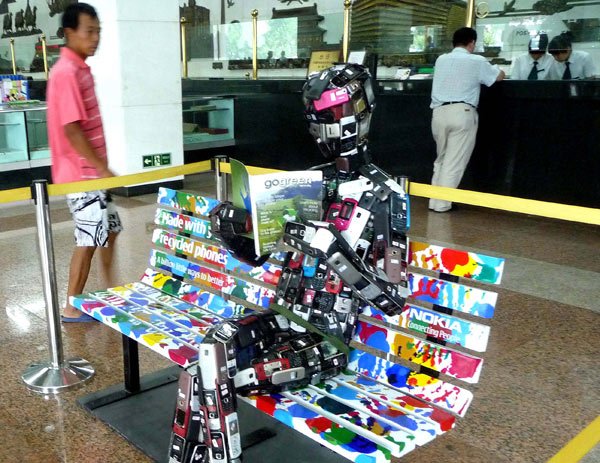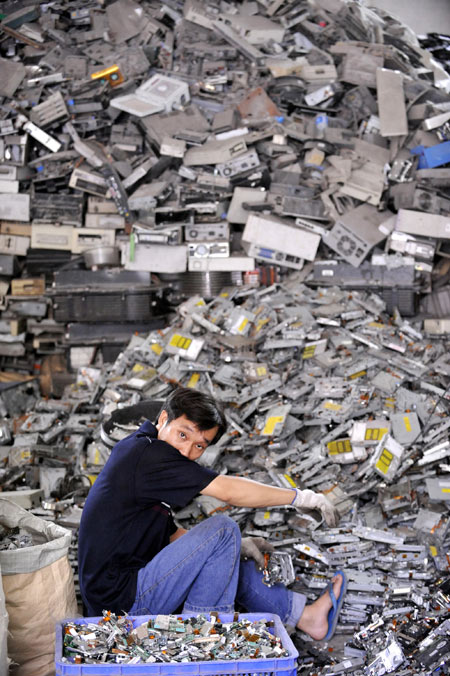
Careless e-waste disposal pollutes environment
For most people, disposing of electronic waste is an afterthought, and used devices are often thrown into drawers and forgotten, sold at secondhand markets or dumped with other household trash.
 |
|
A robot model made from hundreds of used cell phones on display in a post office in Beijing last year. Wen Bao / for China Daily |
Few people realize that the unwanted gadgets could be a gold mine - literally.
About 320 metric tons of gold and more than 7,500 tons of silver - together worth $21 billion - are used each year in manufacturing electronic devices.
Most of those valuable metals are lost - less than 15 percent are recovered through "urban mining" of e-waste, according to a report by the United Nations University in July.
China is the second-largest producer of e-waste, with an estimated 2.3 million tons of such waste generated annually, trailing only the United States, by 0.7 million tons, according to the report.
Experts estimate that by 2020, the amount of e-waste being disposed of will be four times that of 2007, and developing economies will be the largest receptacles.
"Precious metal 'deposits' in e-waste are 40 to 50 times richer than ore mined from the ground," said Lai Yun, director of the pollution control project at Greenpeace China. "The quantities of gold, silver and other precious metals available for recovery are increasing in tandem with fast-increasing sales of electronic and electrical goods."
Computers, for example, are 54 percent steel, 20 percent copper and aluminum, 17 percent plastic and 8 percent circuit board, all valuable when they are recycled.
This could be a very lucrative business, he said.
So what is preventing China from tapping into that potential? According to Lai, the problem lies purely with a lack of recycling channels and financial incentives.
A study by the E-waste Civil Action Network, a Beijing NGO, found that convenience is the first thing most people take into consideration when disposing of used electronic products.
|
 A worker at an e-waste disposal workshop in Shantou, Guangdong province, has a rest on May 31. Liang Xu / Xinhua |
Without convenient channels for the public to recycle e-waste, most people choose either to put the devices aside somewhere or dispose of them together with other household trash, the study found.
Up to 60 percent of Chinese consumers, however, choose to sell the devices to reclaimed waste collectors or secondhand markets, which are easily found in some neighborhoods.
Discarded computers and other high-end appliances are then sent by truck to unlicensed workshops for illegal processing, mainly in Zhejiang, Hebei or Guangdong provinces, all hubs for the underground disposal market.
"It's impossible for us to allocate personnel to all households to collect the e-waste - the cost would simply be too high for us," said Yuan Jie, manager of the Green Spring Environmental Co, one of the four qualified operations in Beijing that process e-waste and send recycled materials to manufacturers, such as Shougang Group, a steel company in Beijing.
The company gets the devices from the public, which can call a hotline to arrange for their collection. However, with an average of 100 devices collected each month, the supply is far from adequate for the company.
And many people say they have never heard of the hotline.
"I usually give e-waste away or sell it to local vendors, who are right in the community and come pick up the devices," said Wang Yu, 26, a Beijing resident. "Most of my neighbors do the same thing."
Yuan said Green Spring began to have a sufficient supply of e-waste starting in 2008, thanks to a home appliance trade-in policy that gave people a discount on purchases of new electronic equipment for handing in their used ones.
"Individuals were paid to encourage them to turn in used electronic appliances and worn-out goods," he said. "Most of those appliances ended up in our station, and were turned into useful material without polluting the environment."
Hard to compete
However, since the discount policy ended in December, the company has witnessed an "extremely sharp drop" in supply.
Yuan said that for the moment, it gets equipment only from universities, businesses, government departments and State-funded institutions, and that is "far from enough".
The company is trying to continue cooperating with large appliance retailers, such as Suning, to encourage residents to trade in used appliances through discounts on new ones, he said.
"However, it's nothing compared with years ago and most of the used electronic devices still end up in informal workshops," he said.
In addition to disposing of e-waste with vendors, Beijing resident Wang said many turn to informal groups of merchants for the higher prices they pay.
"Some of the merchants offer a price even higher than what the large appliance retailers did under the trade-in policy," he said.
Yuan said there is no way that licensed companies, where the government would like to have the e-waste end up, can compete with the individual vendors without government subsidies, to balance out the operational costs of the machinery they must operate, which far exceeds the value of their output.
"We started our business with more than 150 million yuan ($23.6 million) invested in the facilities to prevent secondary pollution, while they simply head out with a hammer and ax," said Yuan.
In China, most e-waste is recycled informally, by scavengers who sort trash by hand. Most electronics contain toxic substances and pose serious threats to health, soil and groundwater when collected and sorted and incinerated outdoors, he said.
The illegal reclamation chain and nonstandard channels, according to Shi Jianhan, a volunteer with the action network and author of the report, make considerable profits.
"Most of the illegal workshops dismantling electronic products don't have pollution treatment facilities, so their operating costs are much lower than those of licensed enterprises, making them more competitive than the legal factories," he said.
"They simply break down used electronic equipment without taking any precautions, in total violation of national standards," Yuan said.
Yuan's company invested more than 10 million yuan in a facility for dismantling refrigerators, which, without proper care, could leak fluorine, polluting the environment, he said.
In addition to facilities for dismantling televisions, air conditioners, personal computers and washing machines, the company will further introduce machines to break down cell phones and MP3 players, Yuan said.
"The electronic gadgets ending up in the hands of the waste collectors do not turn into precious metals, but serious pollution, yet people keep going to them," he said.
Mao Da, an expert in solid-waste management at Beijing Normal University, said that all cell phone components contain hazardous substances, including lead, chromium and mercury. When buried in a landfill or incinerated with other household trash, they seriously pollute soil and groundwater with the dioxin and mercury contained in the batteries.
The devices sold to the secondhand electronic markets, where the majority of used electronic appliances end up, are even more polluting than those that are simply buried underground, he said.
More than 170,000 people in Beijing earn a living collecting trash, and they have their industry chain of collection, processing and marketing.
Because they are small workshops, they do not have the necessary pollution treatment facilities.
"The country will face rising environmental damage and health problems if e-waste recycling is left to the vagaries of the informal sector," he said.
Improvement stalled
China has been gauging public opinion to find proper ways of processing e-waste since 2003. Now, almost 10 years later, only government departments and State-funded institutions dispose of their e-waste in a green way, and most of the public is aware of no other channel to dispose of the devices than individual vendors.
The Chinese Research Academy of Environmental Sciences drew up a draft proposal in 2006, in an attempt to set up the necessary equipment in Beijing to collect, transport, store, dismantle, recycle and process e-waste by 2015, having a processing capacity of three million devices annually. Yuan said legislation is needed to force the public to hand in e-waste to the qualified processing organizations.
Despite all the difficulties, some efforts are being made to deal with the problems.
Mao Yunshi, a member of the National Committee of the Chinese People's Political Consultative Conference, China's top political advisory body, and the head of the Business Management Research Department at Sun Yat-sen University, called on the government to pay more attention to phone disposal during the two sessions this year.
He suggested phone manufacturers foot the bill for programs through special levies, in accordance with the principle of "whoever manufactures pays for the consequences".
"We now lag far behind in legislation on the recycling of old cell phones and accessories," said Mao Yunshi. "There are some regulations covering bigger appliances, such as refrigerators and air conditioners, but small devices are not included."
The State Council passed a recycling management regulation on scrapped electronic equipment that requires all licensed e-waste processing companies to be equipped with anti-pollution facilities and safety devices.
The regulation took effect on Jan 1, 2011, and applies to all companies in the country.
The State Council also started gauging public opinion on a system in which people disposing of e-waste will have to register under their real names, so as to "regulate the management of used electronic appliances and better use the resources and protect the environment".
If the regulation takes effect, it might better regulate the market and industry of used electronic products, but it could hardly put an end to the widespread workshops.
According to Mao Yunshi, financial incentives will help recyclers compete with unauthorized scrap collectors and boost the program to provide home pickup services or allocate recycling stations for smaller electronic devices at convenience stores throughout the capital, to encourage public participation.
Wang, the Beijing resident, said: "I know that the electronic appliances should not end up in landfills, because they'll cause serious pollution, but I never thought what I threw away is worth this much.
"It's exciting to think of you might even get a car with the money made in trading all the e-waste in the neighborhood, and I suspect that when we can recycle e-waste as easily as other household trash, people will be very willing to do that."
zhengxin@chinadaily.com.cn







